10
August 2001
![]()
2. "Turkish deputy PM says security concept jeopardising EU bid", Turkey's Deputy Prime Minister Mesut Yilmaz warned late on Thursday that the country's concept of security threatened its bid to join the European Union, defending his position in a row with the powerful army.
3. "Turkey: Israel's Sharon Suffers Diplomatic Blow", the least one can say about Ariel Sharon's visit to Ankara yesterday is that it took an unexpected and unpleasant turn for the Israeli prime minister.
4. "Iran: Doubts Continue Over Gas Deal With Turkey", Iran and Turkey disagreed this week on the reason for the delay in their $20 billion gas deal, which was supposed to start on 30 July. The latest dispute raises doubts about whether the pipeline between the two countries will open in September, as announced.
5. "TUSIAD: 'Democratic maturity is to discuss even the most sensitive issues without causing instability'", ''Motherland Party (ANAP) Chairman Mesut Yilmaz's stating that the national security concept should be redefined is an initiative to start a discussion in line with democratic practices,'' TUSIAD said in a statement on Wednesday.
6. "TURKEY", Turkish President Ahmet Sezer supports the military's efforts for continued modernization amid the nation's fiscal crisis.
1. - AFP - "Turkish police detain human rights activist":
DIYARBAKIR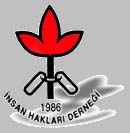
Police in mainly Kurdish southeast Turkey have detained a leading
human rights activist after he visited the region to investigate claims
of forced evacuation of villages and serious rights abuses by officials,
Turkey's main human rights watchdog said Thursday.
The Turkish Human Rights Assocation (IHD) said in a statement that its deputy chairman Osman Baydemir was taken into custody in Sirnak province after he interviewed villagers who claim to have been forced out of their villages. No reason was given for his detention, the IHD said.
Baydemir's investigation followed allegations that security forces forcibly evacuated the 250 residents of the Asat and Ortakli villages in Sirnak on July 21, holding them responsible for a mine blast in which a soldier was killed and 10 others injured. Thirty-three villagers were detained for days and subjected to torture and ill-treatement, the IHD said. It said authorities had also banned all entrances and exits from the villages of Ulucak, Dagalti and Hisarkapi, and were threatening the residents with evacuation. Turkey's southeast was the scene of 15 years of heavy fighting between government troops and rebels of the Kurdistan Workers Party (PKK) who took up arms against Ankara in 1984 to demand Kurdish self-rule in the region.
The conflict, which led to allegations of gross human
rights violations on both sides, including the forced evacuation and
torching of villages, has claimed more than 36,000 lives. The fighting
has diminished since since September 1999, when jailed PKK leader Abdullah
Ocalan urged his militants to abandon their armed campaign to seek a
peaceful resolution to the Kurdish conflict. But the powerful Turkish
military has dismissed the peace bid as a ploy, insisting that the rebels
should either surrender or face the army. ![]()
2. - AFP - "Turkish deputy PM says security concept jeopardising EU bid":
ANKARA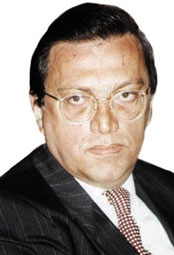
Turkey's Deputy Prime Minister Mesut Yilmaz warned late on Thursday
that the country's concept of security threatened its bid to join the
European Union, defending his position in a row with the powerful army.
Ankara's failure to lift restrictions on freedom of speecy and thought would spell an end to its bid to become a member of the 15-nation European Union, Yilmaz warned in a television interview. "If Turkey does not abolish these unnecessary restrictions soon, in September or October, it will miss the EU train and move away from the contemporary world. That is the real threat," Yilmaz told NTV news channel. Turkey's current understanding of national security, still based on Cold War conditions, would never get the country past the EU door, the head of the conservative Motherland Party (ANAP) said.
"In all democratic countries, politics determined national security. But in Turkey it is national security that defines politics," he added. Yilmaz's comments marked the latest episode in a severe dispute with the army, which blew up last week when he said Turkey's concept of security hindered its development, especially efforts to become an EU member, and urged a public debate on the issue. The army lashed out at Yilmaz in a strongly worded statement on Tuesday. It described his remarks as "worrying", stressing that Turkey was still fighting radical Islamic and pro-Kurdish movements that threatened its secular order and integrity.
Yilmaz told NTV Turkey should hold a debate on whether the current restrictions on freedom of speech and thought were necessary to protect the country. "We have to discuss whether our territorial integrity and secular order would be endangered if we expand rights," he said. Turkey was declared a candidate for EU membership in December 1999. But it has so far failed to carry out any of the major reforms -- particularly in the realms of democracy and human rights -- which are a pre-condition for the start of accession talks with Brussels. The government is planning to summon parliament back to work in September, before the usual end of its summer recess, in order to pass a comprehensive package of constitutional amendments. The aim is to approve the reforms before the European Commission -- the EU's executive arm -- publishes its November progress report on Turkey's bid for membership of the bloc.
The draft package includes the abolition of the death
penalty, except in times of war and for terrorist crimes, and the lifting
of a ban on using "forbidden languages" to express and disseminate
opinions. The package also includes a key proposal to include more civilian
members in the country's top policy-making body, the military-dominated
National Security Council. ![]()
3. - Radio Free Europe - "Turkey: Israel's Sharon Suffers Diplomatic Blow":
PRAGUE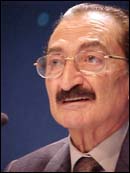
The least one can say about Ariel Sharon's visit to Ankara yesterday
is that it took an unexpected and unpleasant turn for the Israeli prime
minister.
"Sharon gets severely reprimanded," read today's headline of Turkey's "Sabah" mass-circulation daily. Indeed, Turkish Prime Minister Bulent Ecevit strongly criticized Sharon's right-wing cabinet for demanding a total halt to violence as a condition for resuming talks with the Palestinians.
Ecevit said that, in his view, such demands were "unrealistic." He also urged his Israeli counterpart to revive the Middle East peace process in an effort to end the 10-month-old conflict that has killed almost 700 people, mostly Palestinians.
On a highly unusual, non-diplomatic note, the Turkish prime minister also made clear that he did not believe Sharon's claims that Palestinian leader Yasser Arafat should be blamed for recent terrorist attacks against Israeli targets.
"I cannot think of any statesman or a politician who would support terror," Ecevit told a press conference as Sharon sat by, before calling upon his host to accept international observers in the conflict zone and lift an embargo on the Gaza Strip and the West Bank.
The Turkish prime minister also said his country was ready to host peace talks if they were to resume. Ignoring Turkey's warning, Sharon said there could be no dialogue with the Palestinians until the violence stops.
Talking to reporters later in the day, Sharon tried to downplay Ecevit's public scolding, describing the meeting he had with his Turkish counterpart as "warm." Israel's English-language "Jerusalem Post" daily quoted him as saying that the disagreement between Ankara and Tel Aviv was "healthy" and that there was not the slightest sign of conflict between the two capitals.
Sharon's comments contradicted some Turkish media reports, which described the atmosphere of the talks as "strained." In any case, Ecevit's blunt comments further illustrates the deteriorating relations between Sharon's government and the international community. Even the United States, Israel's main ally in the West, has criticized Sharon for the recent assassinations of suspected Palestinian terrorists.
Commentators in Turkey generally interpreted Ecevit's tough stand as a gesture toward Iran and Ankara's Arab neighbors. Although Turkey maintains full diplomatic ties with the Palestinians and supports their demand for statehood, it is Israel's traditional and only supporter in the Middle East.
Five years ago, both countries signed a military cooperation agreement that sparked criticism from most Arab countries and Iran. Both countries regularly hold joint military exercises and Israel is currently modernizing Turkish jet fighters under a $700 million contract.
Israeli chief of staff Shaul Mofaz held military cooperation talks in Ankara last month (27 July), days after Israel's Defense Minister Benyamin Ben Eliezer paid a visit to the Turkish capital.
Relations between Ankara and most Arab capitals deteriorated during the 1991 Gulf War. As a NATO member, Turkey was the first regional country to join the U.S.-led international coalition to drive Iraqi troops from Kuwait.
But Ankara is now steadily moving toward rebuilding economic and political ties with its Arab neighbors and with Iran, another country which is critical of Turkey's military cooperation with Israel.
Officials in the Iraqi capital Baghdad have not reacted to Sharon's visit to Ankara. But Syria, Israel's arch-rival in the region, has issued a clear warning to its Turkish neighbor. In a statement published yesterday (8 August) in the official "Al-Baath" daily, the Baath ruling party urged Ankara not to jeopardize its interests in the Arab world by supporting Israel's current "no-talk" policy toward the Palestinians.
Sharon's visit to Ankara triggered some controversy in Turkey itself, notably among left-wing political parties and Islamic groups. Police detained some 50 anti-Israel demonstrators in Istanbul yesterday. Trade unionists and left-wing protestors staged a separate demonstration in Ankara to express their support for the Palestinians. On 7 August, riot police detained some 130 Islamist protestors in both cities.
It remains unclear whether the Israeli prime minister -- who also met with President Ahmet Necdet Sezer and State Minister Kemal Dervis -- attained any concrete results during his visit.
During the press conference they held yesterday, neither
Ecevit nor Sharon commented on the defense cooperation between their
countries. CNN-Turk private television channel reported that Turkey
agreed in principle for Israel to modernize 1,000 of its tanks. But
details of the deal remain to be finalized. ![]()
4. - Radio Free Europe - "Iran: Doubts Continue Over Gas Deal With Turkey":
Iran and Turkey disagreed this week on the reason for the delay in their $20 billion gas deal, which was supposed to start on 30 July. The latest dispute raises doubts about whether the pipeline between the two countries will open in September, as announced. Our correspondent Michael Lelyveld reports.
BOSTON
Doubts continue this week for Iran's 25-year gas deal with Turkey
after the two countries blamed each other for failing to start deliveries
last month.
A week ago, both sides seemed to agree that Iran needed another month to overcome "technical problems" at the border before it could begin pumping gas through a metering station at the town of Bazargan.
Following a series of earlier setbacks in the $20 billion deal, Iran and Turkey had set 30 July as the date that gas would flow through new pipelines from Tabriz to Ankara.
But in an interview on 4 August with "Iran Daily," Iranian Oil Minister Bijan Namdar-Zanganeh said of his Turkish counterparts: "That's their problem. They are, apparently, unable to overcome technical difficulties, but are blaming us for the delay."
Turkey's version of events is that the metering station, which is to measure the gas, must be certified by Turkish experts under the terms of the 1996 sales contract with Iran. So far, the two sides seem to be communicating through the press.
On 6 August, Turkish Energy Minister Zeki Cakan told a press conference: "When the certificate is signed, the natural gas will be bought. We don't have any problems regarding the natural gas to be bought from Iran. We have completed all of our obligations," the "Turkish Daily News" reported.
Zangeneh said the metering station has been completed "in accordance with international standards," raising questions about why Turkey is withholding its approval.
The standoff may lead to a whole host of problems.
Zangeneh has been under fire for months from conservative critics who accuse his ministry of allowing corruption in deals with foreign oil companies. Tensions over oil interests are also high because of the 23 July encounter between an Iranian gunboat and Azerbaijani survey ships on the Caspian Sea.
The "Iran Daily" asked Zangeneh a series of uncomfortable questions about whether Turkey would try to cancel the gas deal and whether it was responding to pressure from Israel. Zangeneh's answer was no, on both counts. But pressure on the minister seems to be rising in the days before President Mohammed Khatami announces his cabinet choices for his second term.
Iran's press has yet to focus on Russia's success in the Turkish market this week at a time when Iran's first big gas export deal seems to be stalled.
From 4-6 August in Istanbul, top Russian government officials celebrated the passage of a mammoth pipe-laying ship through the Turkish Straits to the Black Sea. The transit marked yet another start to the Blue Stream project to pipe gas from Russia, starting in March 2002.
Russian Deputy Prime Minister Victor Khristenko said on 6 August that with the project to ensure the energy security of the region, "a new geography will emerge," Interfax reported. Whether that geography will include Iran remains to be seen.
Although it received less attention, Turkey asked Russia's Gazprom to increase its daily gas deliveries by 15 percent over the contract amount for this year, Interfax reported on 6 August. The new supplies through Bulgaria may be a sign that Ankara does not expect to get Iranian gas anytime soon.
Even the most optimistic figures from the Turkish pipeline company Botas show that the country's gas supplies will exceed demand until 2003, if the Iranian imports are figured in.
Perhaps in fairness to Zangeneh, "Iran Daily" published an account of the 30-year history of plans for the gas deal with Turkey, listing some of the troubles that have arisen along the way. Among these was the outbreak of the Iran-Iraq War, which froze "Iran's efforts to consolidate ties with neighboring and Muslim countries," the paper said.
The difference with the 1996 contract is that it includes a "take-or-pay" clause, which could expose Turkey to millions of dollars in damages if it refuses Iranian gas. It is unclear whether the certification issue can be used as a legal loophole for long.
So far, Iran has been relatively restrained on the issue of fines, perhaps because it wants to avoid an atmosphere of conflict on several fronts at once.
Zangeneh argued that Turkey has already spent $1.4 billion on the gas plan and is unlikely to walk away from an investment that large.
That reasoning seems sound, but events of the past week
make it impossible to tell. ![]()
5. - Anadolu Agency - "TUSIAD: 'Democratic maturity is to discuss even the most sensitive issues without causing instability'":
ISTANBUL
Turkish Industrialists' and Businessmen's Association (TUSIAD) has
said that democratic maturity was to be able to discuss even the most
sensitive issues without causing instability.
''Motherland Party (ANAP) Chairman Mesut Yilmaz's stating that the national security concept should be redefined is an initiative to start a discussion in line with democratic practices,'' TUSIAD said in a statement on Wednesday.
''While we still vividly remember how a disagreement in the government triggered the economic crisis, starting a new discussion which would cause economic and political instability worries everyone,'' TUSIAD said.
''It is known by everyone that the success of the economic program depends on political stability and harmony in the government. What will bring this stability is not to cover up the problems but to discuss and finalize the disagreements on democratic platforms. Democratic maturity is to be able to debate even the most sensitive matters without causing instability.''
''A comrehensive constitutional change is on our agenda and Turkey is discussing the need to comply with Copenhagen criteria. Therefore, it is the right time to open this discussion. What needs to be done is to discuss the matter with all its sides by not blocking certain views. Every issue could be debated in all grounds in democracies,'' TUSIAD said.
TUSIAD indicated that Turkey was trying to form a balance
that exists in the modern Western democracies. ''Speeding up Turkey's
integration with the EU and realizing the Copenhagen criteria seems
to be the only way to maintain this balance,'' TUSIAD concluded. ![]()
6. - Middle East Defense - "TURKEY":
Turkish President Ahmet Sezer supports the military's
efforts for continued modernization amid the nation's fiscal crisis.
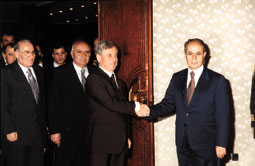
Sezer has expressed the need for Ankara to maintain military upgrades
and procurement of new weapons despite the current budget shortfall.
The president has been regarded as a leading critic of the military's
dominance of the nation's political life.
But in a rare pronouncement, Sezer said Turkey's strategic location requires a strong defense. The president was speaking on Wednesday during a ceremony in which the navy obtained eight new vessels. One of the vessels will be delivered to Kazakhstan.
Meanwhile, Turkey's nagging economic woes continue to
block the completion of the nation's key military projects. 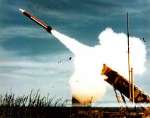
Defense sources said the renewed economic crisis has prevented the government
from signing an estimated $300 million contract for the state-owned
Israel Military Industries to upgrade M-60 tanks. An Israeli delegation
has been negotiating the final details of the contract.
In Ankara, Turkey expects the Bush administration to discuss the deployment of missile defense systems in the NATO country.
The systems, defense sources said, could include such futuristic weapons as an airborne laser.
In other developments, Turkey's navy received 12 vessels
in one of the largest deliveries to the service. They included a range
of combat and support vessels, includin a Gur-class submarine, Kilic-2
class fast-attack craft, a minehunter vessel and a coastal patrol boat.

Bulgaria and Turkey have launched a joint military exercise to improve
interoperability along the Bulgarian-Turkish border.
The exercise includes training on various firearms, such as machine-guns and semi-automatic rifles. The Turkish portion of the exercise is being supervised by the Turkey's Land Forces Command.